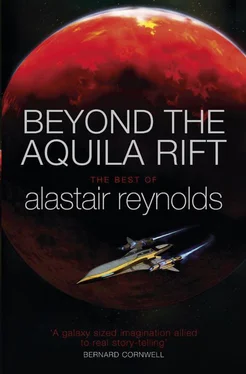She watched him enter the building via the porch airlock. Some bubbles erupted out of the dark mouth of the door, and then there was nothing. She didn’t think it would take him long to place the helmet and the companion, especially if he already knew his way around the building.
The buggy started moving.
It was sudden, purposeful activity, not the result of the brakes being loose or some underwater current stirring it into motion. It began to turn, steering back the way they had come. This wasn’t right. Yukimi looked despairingly at the console, with its many controls. She didn’t know which one to hit. There was a red panel, lit up as if it was some kind of emergency stop. She whacked it with her palm and then when there was no response she whacked it again and again. She grabbed hold of the steering joystick Corax had been using and tried yanking it left and right. But nothing she did had any effect on the buggy’s progress. It was already climbing out of the lake, the water beginning to drain off the top of the canopy as it pushed into air. “Stop!” she shouted. “Corax isn’t back yet!”
But either the buggy was too stupid to realize what was happening or Corax had programmed it to ignore her.
Soon it was out of the lake. Once the ripples had settled, Yukimi could see the outline of Crowe’s Landing exactly as it had been before. Nothing had changed. Except now Corax was down there, inside the armor, inside the watertight building.
She remembered him punching commands into the buggy before he had stood up. Had he been telling it to return to the Scaper after a set interval with Yukimi was still aboard?
Numb, but knowing there was nothing she could do, she sat in silence for the rest of the journey.
* * *
THE FLIER CAME not long after the buggy climbed back into the Scaper’s belly. She was sitting alone in the galley, barely able to speak, when she heard footsteps echoing down the long metal corridors from the landing bay. Eventually two adults came into the galley. One was a young-looking man carrying a heavy bag. The other was her father, looking worried and gray. She braced herself for a stinging reproof, but instead her father rushed to Yukimi and hugged her. “I’m sorry,” he said. “We didn’t realize.”
When she could find the words she asked, “Am I in trouble?”
“No,” her father said soothingly. “I am. But you’re not. Not now. Not ever.” He hugged her again, as if he couldn’t quite believe he had her in his arms, that it wasn’t a dream.
“Where’s the old guy?” asked the other man.
“I presume you mean Corax?” Yukimi asked.
“Yeah, Corax.” The young-looking man set his bag down on the table and began unloading it. “I’m his replacement. That’s why the flier was scheduled, so I could take over from him. The sponsors were worried he was getting a little too old for this kind of thing.”
“Corax isn’t coming back,” Yukimi said.
The man looked impatient with her, as if she wasn’t showing sufficient deference. “What do you mean, not coming back? What happened to him? Where is he?”
She looked him straight in the face, daring him to dismiss what she was about to say. “That’s between me and Corax.”
“Are you all right, Yukimi?” her father asked gently.
“I’m fine,” she said. Which, for the moment at least, was the truth. She was sad for Corax, sad that she wouldn’t see him again. But whatever he had done, he must have planned on doing it long before she took her airship ride. That he had shared it with her, that he had allowed her to place the companion in the time capsule, and to record her thoughts before doing so—her angry, bitter, wounded thoughts—was a privilege and a secret she would always carry with her. And whatever happened next, however hard it got with her family, she would have the knowledge that she had participated in something wonderful and unique, something no one else would know about until the seas retreated, on some impossibly distant day in the future of Mars, her Mars.
The flier took off, leaving the other man alone on the Scaper. Her father let Yukimi sit by the window as the flier accelerated back toward Shalbatana City. Nose pressed to glass, she studied the wheeling, rushing landscape for the lake where Crowe’s Landing used to be. She saw a few patches of water, some vehicle tracks, and some of them looked vaguely familiar. But from up above, with an entirely different perspective, she couldn’t be certain.
“Shirin’s coming back from Venus,” her father said, breaking the long silence.
“Oh,” Yukimi answered.
“She says she’s sorry she hasn’t been in touch as often as she’d have liked.”
“I’m sorry as well.”
“She means it, Yukimi. I saw how upset she was.”
Yukimi didn’t answer immediately. She watched the ground hurtle by, thinking of Corax in his armor, the old man and the Martian sea. Then she reached out and took her father’s hand in hers. “It’ll be good to see Shirin,” she said.
THE AFTERNOON before my speaking engagement at New York’s Hayden Planetarium I find myself at The Museum of Modern Art, standing before Vincent Van Gogh’s De Sterrennacht , or the Starry Night. Doubtless you know the painting. It’s the one he created from the window of his room in the asylum at Saint-Rémy-de-Provence, after his voluntary committal. He was dead scarcely a year later.
I have seen paintings before, and paintings of starry nights. I think of myself as something of a student of the human arts. But this is the first time I grasp something of crucial significance. The mad yellow stars in Van Gogh’s picture look nothing like the stars I saw during my deep space expeditions. My stars were mathematically remote reference points, to be used only when I had cause to doubt my inertial positioning systems. These stars are exuberant, flowerlike swabs of thick-daubed paint. More starfish than star. Though the painting is fixed—no part of it has changed in two hundred years—its lurid firmament seems to shimmer and swirl before my eyes. It’s not how the stars really are, of course. But under a warm June evening this is how they must have appeared to this anxious, ailing man—as near and inviting as lanterns, lowered down from the zenith. Almost close enough to touch. Without that delusion—let us be charitable and call it a different kind of truth—generations of people would have had no cause to strive for the heavens. They would not have built their towers, built their flying machines, their rockets and space probes; they would not have struggled into orbit and onto the Moon. These sweetly lying stars have inspired greatness.
Inspired, in their small way, me.
Time presses, and I must soon be on my way to the Hayden Planetarium. It’s not very far, but in the weeks since my return to Earth I have gained a certain level of celebrity and no movement is without its complications. They have already cleared a wing of the museum for me, and now I must brave the crowds in the street and fight my way to the limousine. I am not alone—I have my publicity team, my security entourage, my technicians—but I still feel myself at the uncomfortable focus of an immense, unsatiable public scrutiny. So different to the long years in which I was the one doing the scrutineering. For a moment I wish I were back out there, alone on the solar system’s edge, light hours from any other thinking thing.
“Vincent!” someone calls, and then someone else, and then the calls become an assault of sound. As we push through the crowd fingers brush against my skin and I register the flinches that accompany each moment of contact. My alloy is always colder than they expect. It’s as if I have brought a cloak of interplanetary cold back with me from space.
Читать дальше











